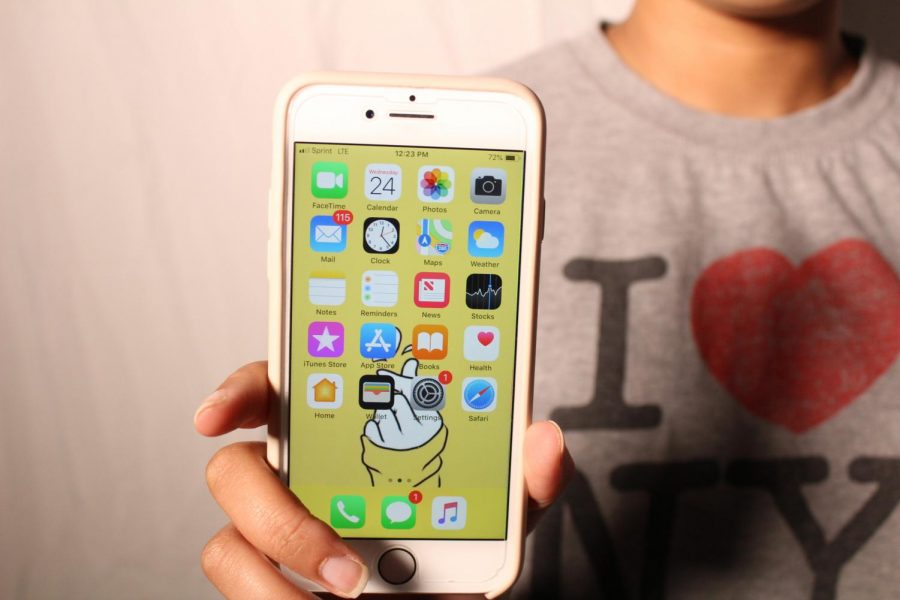A Phone Usage Debate
Phone usage with teens has been rising to high numbers. Students use their phones both inside of the classroom and outside of school. There are many reasons teens use their phones throughout the day. Some students use their phones to keep up with their social lives through social media and texting while others use their phones for entertainment or academic purposes. Phones can have both positive and negative effects. Students state whether they believe their phone usage is either active or infrequent and how they think it affects their lives and on a daily basis.
Even though phones can serve as a helpful tool for students in the classroom, it can also lead to distractions. Tenth grade student Izzy Vallejos finds her phone to be a cause for an occasional lack of focus in school. “Because my phone can sometimes be a distraction, it prevents me from getting my homework done in a reasonable amount of time,” Vallejos said. When the teacher isn’t talking, she often spends much of class time on her favorite apps such as Instagram, Twitter, and Snapchat. “I use my phone too much. I feel like I am constantly checking it.” said Vallejos. Izzy Vallejos daily phone use is averaged at five hours and fifty four minutes.
Balancing phone time and school can be difficult. Ninth grade student Mia Angarita isn’t negatively affected by her phone. Mia learned how to balance school work with phone activity. “I know how to manage my school work and time to be on my phone. It doesn’t affect my school work because I know when to put my phone down and I can monitor myself.” said Angarita. For some students phone usage can alter their sleeping habits. “School work actually affects my sleeping habits more than my phone.” Angarita said. Mia typically uses her phone when bored in in class, and spends 2-3 hours on Instagram and TikTok.
Ninth grader Heath Hamilton only spends up to two hours a day on his phone. “I use my phone less than the average. Since I am never on my phone or only on it for two hours a day, it doesn’t affect my sleeping habits or school work.” said Hamilton. It’s a common belief that phone usage can put the users off task. “I like having my phone. People just need to know how to manage it in order to stay on track.” Hamilton uses his phone during class free time to go on Instagram, Snapchat, or Clash of Clans.
Ninth grade history teacher William Tucker feels that phones can be helpful and a vital part of learning, but time spent on devices should still be limited and monitored. “I think they are valuable but there should be more oversight into what people and especially kids are looking at and doing. School is for learning and sometimes phones disrupt that. My rule is that when students walk into the classroom they have to put their phones in pouches.” said Tucker. Tucker says that he usually only spends around 20 minutes on his phone during school, “I don’t really do much with my phone besides schedule meetings or just add things to my calendar. I sometimes check emails but I prefer checking those on my computer. I also read twitter but I’m typically not on my phone as much as the normal person.” Overall, Tucker thinks students should be aware of how phones affects themselves and others.
Along with possible disengagement in school, screen time can also impair students interactions with others. Middle school art teacher Mariaclare Herce believes that phones cause distractions making the students less engaged in the classroom and have a negative effect on how they connect with other individuals, “Kids are still young and developing emotional skills and ability to control those emotions. When living in a world of 3 by 2 inches it makes you lose sight of the world around you and takes away curiosity. It becomes a tool used for to help manage hard emotions instead of talking them out. It important for kids to learn and develop their emotions and learn how to communicate without a screen.” Herce tries to demonstrate the positive effects of disconnecting from devices by not using her phone during school hours. Herce said, “My job is to connect to young people and help them understand themselves and their emotions, so my phone does not help me with my job.The best way for me to do my job is to look at them and talk to them to show the importance of human interaction so my phone is never on and I’m never on it while I’m working.” There are green, yellow, and red zones throughout the school, but there isn’t one set policy, “What’s so challenging about cellphone use is there is no set school policy so students still feel entitled to have their phone even when in a red zone. I try to teach my students that there is a time to have a phone and that using a phone pulls you away from what’s in front of you. It’s healthy to have personal space from your friends and not always feeling so attached to everyone and what they’re doing.” said Herce.



